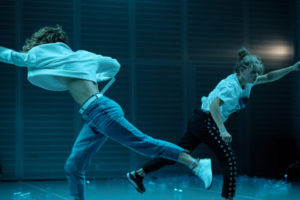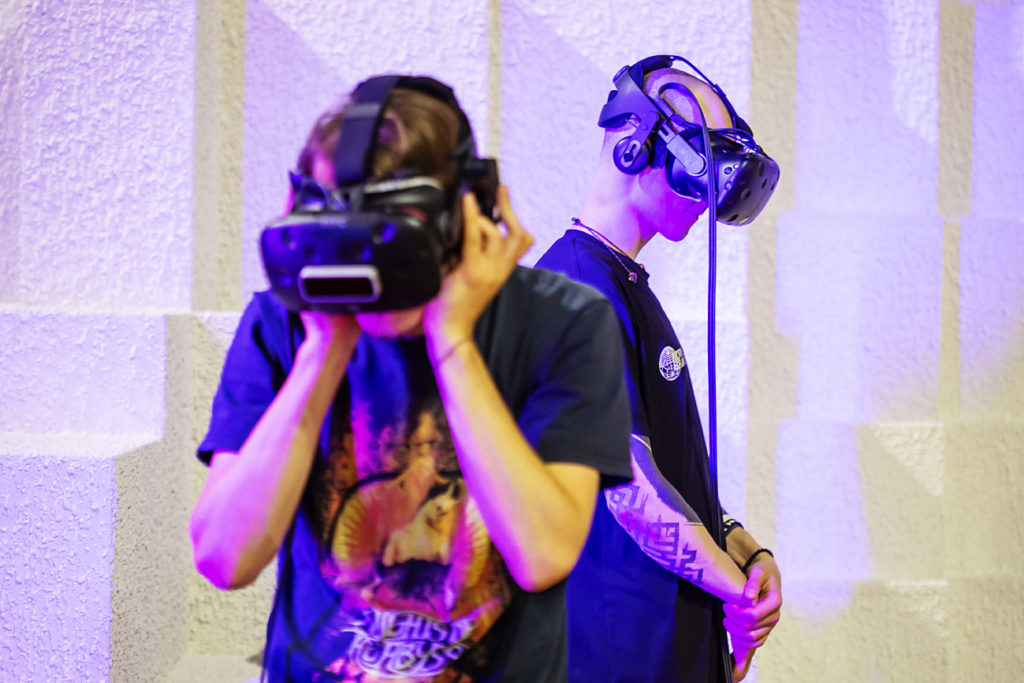
Iza Szostak, National Affairs. Photo Bartosz Górka
Contemporary Polish performance scene
By Marcelina Obarska (translation Joanna Figiel)
The role of drama theatre in modern Poland cannot be stressed enough. It is not only the subject of debate focused on aesthetics, but also reflects ethical conflicts and resonates with social concerns, often arousing turbulent discussions and disputes. For some time now, the longstanding, dominant formula of theatre with a strong presence of the director-demiurge (typically male, less often female) has been giving way to an alternative vision of theatrical spectacle. (It is difficult to pinpoint a specific date, but one can consider the second decade of the twenty-first century as the period of significant change). Great masters of contemporary Polish theatre – Krystian Lupa and Krzysztof Warlikowski – remain faithful to their methods: by entering the discourse of outstanding masterpieces they create text-based epic performances with expressive parts and refer to the figures of History, Memory, and Identity. Many of the performances of directors such as Jan Klata, Maja Kleczewska or Grzegorz Jarzyna are also based on
In parallel, alongside the theatre of great narratives, another model of creation is being developed: one can call it a theatre of weak (in the philosophical sense) dramaturgy. Such a non-dramatic theatre is based on scripts that are largely created during the work on stage, upon the canvas of a collective creative encounter. Distancing itself from presenting a logically structured narrative it communicates not via history, but above all by presence. Weak dramaturgy makes room for what is private, intimate, and often abject; it is also open to a series of unknowns, draws on improvisation, and does not seek to complete scenes. This trend is represented by, among others, Michał Borczuch, Anna Karasińska and Magda Szpecht. “Weak theatre” is a non-direct response to subsequent generations of “patricidal”[1] creators (including, among others, Jan Klata): for many of the younger creators, the great theatrical demiurges cease to be an obvious point of reference, and the creation of artistic identity is not based on the symbolic struggle with the pantheon of predecessors.
The question of hierarchy of work within theatre and performance is the subject of an extensive debate in Poland today. The problem of abuses resulting from theatrical hierarchy mainly relates to drama theatre and stems from the strong position of a leader-director, cultivated for decades, who traditionally had an unwritten right to use his power, also in bad faith. Among others, Anna Smolar and Weronika Szczawińska are attempting to implement a horizontal, non-violent model of working in drama theatre. Increasingly, the names of artists on posters and in catalogues appear as a non-hierarchical list of names, leaving behind the hierarchy and specific roles. Such gesture intends to dethrone the director and to limit their validity to the level of organizational leadership. Importantly, in recent years in Polish theatre a group of female directors has emerged – in a way, in opposition to the long-standing dominance of male directors. This informal women’s “team” includes, among others, the abovementioned Smolar, Szczawińska, Karasińska and Szpecht, but also Małgorzata Wdowik, Katarzyna Kalwat, and Klaudia Hartung-Wójciak.
A phenomenon that resonates with the digitization of our everyday life is the use of VR (Virtual Reality) and AR (Augmented Reality) technology in theatrical work. Virtual and augmented reality is not only a techno-novelty or an attractive gadget, but also an important dramaturgical tool reconfiguring the structure of the theatrical event and attitude towards its participants. Krzysztof Garbaczewski, the founder of the Dream Adoption Society collective, explores the field of VR and AR. The collective creates applications used in performances, as well as art installations independent of theatrical events, for example the VR and AR-based work, “Aporia. The City is the City” – co-curated by Garbaczewski and the architect Aleksandra Wasilkowska, which represented Poland at the 14th Prague Quadrennial. Others experimenting with virtual reality include Natalia Korczakowska, who – combining a masterpiece of European literature and the latest developments in technology – transferred “Demons” to VR.

Justyna Sobczyk, Ojczyzna (Homeland). Photo Piotr Bedliński, Teatr Polski, Poznan
Recent years are also a heyday of new Polish choreography. This set of practices transcending the essence of dance focuses not so much on aesthetic impressions or technical perfection, but on the nature of the movement itself. The performances of a new choreography elude genre. Artists such as Maria Stokłosa, Iza Szostak, Paweł Sakowicz or Marta Ziółek function between theatre, dance, and performance, consistently creating non-narrative, experimental works that have no ambition to tell stories or depict emotions; rather, they are an attempt to transcend the narrative regime towards topics such as intimacy or identity (often, queer identity); they also engage contemporary philosophical and cultural theories, emphasizing the importance of the concept itself. The new choreography eludes the tools of analysis and interpretation that seek to answer the question “what is the performance about”. Instead they are encouraging the viewer to open up to another kind of cognition – affective cognition. The new choreography performances can be seen as part of performance exhibitions in art centres and galleries. Such exhibitions avoid defining a work of art as a stationary object and the resultant relationship with the viewer. The most prominent example of this kind of thinking are exhibitions curated by Magdalena Komornicka at Zachęta National Gallery of Art, e.g. the 2019 “Project X”, which in its programme included specially prepared minimalist, site-specific movement performances. The status of new choreography as independent of theatre can also be evidenced by the fact that Zachęta, in an unprecedented move, purchased Paweł Sakowicz’s “Jumpcore” for its collection.

Krzysztof Garbaczewski & Aleksandra Wasilkowska, Aporia. The City is the City. Photo Markéta Bendová
Also noteworthy is the offering for the youngest Polish viewers. The creators of children and young adult’s theatre take their audiences very seriously. They are not afraid to engage with difficult topics, do not escape into visual trickeries, but instead create engaging, intelligent performances developing [viewers] both aesthetically and ethically. A qualified team of educators, graduates of, among others, postgraduate diploma in “Theatre Pedagogy”, which since 2014 has been conducted by the Institute of Polish Culture at the University of Warsaw in cooperation with the Zbigniew Raszewski Theatre Institute, ensure the high standard of this offering. Among important events, there is, festival Teatralna Karuzela organized by the Pinokio Theatre in Łódź showcasing work of artists such as Justyna Sobczyk, Alicja Morawska-Rubczak or Robert Jarosz.

Weronika Szczawińska, Rozmowa o drzewach (Talk about Trees). Photo Pat Mic, Komuna Warszawa
The phenomenon of new circus lies somewhat on the sidelines of the performative mainstream. In Poland, it constitutes a kind of cultural update: circus art, without completely rejecting its heritage, builds a new identity – one that is more consistent with contemporary reality and its transformations. Stowarzyszenie Kejos The-at-er Kejos (and the associated Kejos collective) has been operating since 2004 and is a “veteran” of the Polish new circus. Fundacja Sztukmistrze, also promoting this field, points out that contemporary circus is far from the stereotypical image of a space where brutally trained animals are abused as actors in various “numbers”. One of the Foundation’s initiatives is the Wschodnioeuropejski Konkurs Etiud Nowocyrkowych CYRKULACJE [Eastern-European New Circus Competition CIRCULATIONS]. It is also worth mentioning the Cyrkowy Festiwal Podwórkowy Cyrkopole [Cyrkopole Circus Courtyard Festival] – an event held in Wrocław that brings together the most outstanding works of new-circus art of Eastern Europe. Nearby, in Oleśnica, one can find another festival, OFCA [Oleśnicki Circus and Artistic Festival].
[1] Reference to the book written by Piotr Gruszczyński, “Patricides. The younger and brighter in the Polish theatre”, Warsaw: WAB, 2003 (ed. note).


